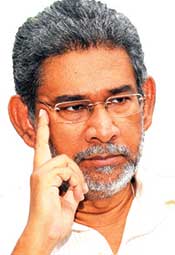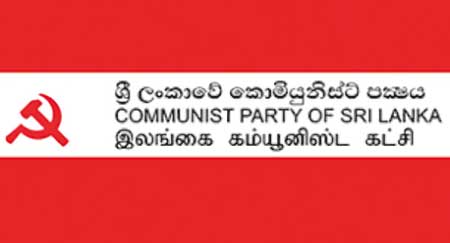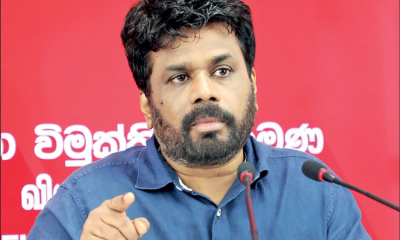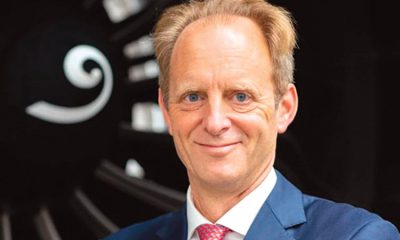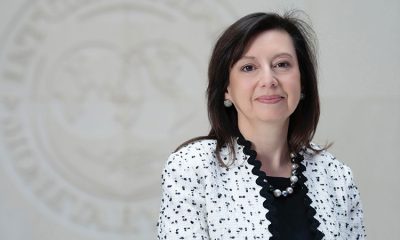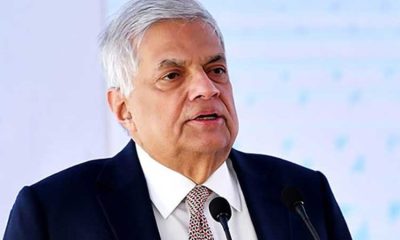Features
80th Anniversary of the Communist Party & The Communist Movement: Potentials & Problems
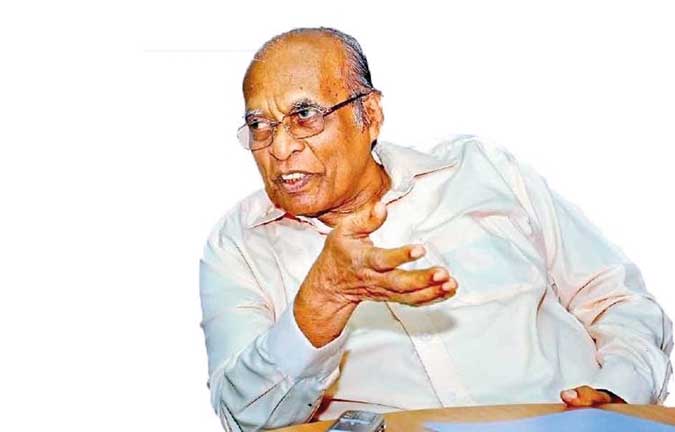
by Dr. Dayan Jayatilleka
The Communist Party of Sri Lanka (CPSL) will celebrate its 80th anniversary early next month. That will mark the 80th birthday not merely of the Communist Party but the broader Communist movement – as distinct from generic Left movement–in Sri Lanka.
As I have argued in an earlier article (The sins of the fathers: The Old Left’s two traditions – The Island), the communist tradition has been considerably consequential on this island and is alive and well in the form of a strong and dynamic contemporary left which derives from and identifies with the communist ideological heritage.
To illustrate, and if I may be pardoned a personal note, in the early-mid 1970s, i.e., despite the terrible repression of the April 1971 uprising, both Prof Rohan Samarajiva and I, who hold antipodal economic and political perspectives today, were, as an undergraduate and high-school student respectively, members of a revolutionary Left organization, Mitipahara (‘Hammer Blow’), founded by the youngest member of the Central Committee of the Communist Party, an intensely intelligent alumni of Moscow State University, who broke away from the party. Still awaiting university entrance, that was the first time I was taken in for questioning by the Intelligence Services Division.
This widely shared heritage alone would make the 80th anniversary of the parent or grandparent party, the Communist party, something well worth celebrating.
There are two other specific reasons to do so. Firstly, the CPSL is due to launch its alternative national economic program. Recalling the knowledgeable and often prescient contribution to economic debates in parliament over decades by DEW Gunasekara who is now the elder statesman guiding the Communist Party, and aware of the group of stellar young economists around the party or sympathetic to it currently, I’d say this document would be a most valuable contribution and a policy event of considerable significance. This is more so because the two main left formations on the island today have not launched such a document (the NPP-JVP’s being an amateurish effort which has suffered the fate that befalls a lead balloon).
Secondly, however small a party it may be, the CPSL has a vital role to play because of its international connections. It is the only party in Sri Lanka that is officially and organically linked to the ruling communist parties of China, Cuba and Vietnam, and thereby the international network and conclaves of communist parties.
This endows the CPSL with the potential to punch quite considerably above its weight. The ruling Communist parties lead countries of historic (China) or stellar (Vietnam) economic achievement or have huge moral-ethical prestige (Cuba). In turn this would permit the CPSL to play two roles.
One, to firm up multifaceted economic ties between Sri Lanka and these countries, even securing economic and social advice, in a situation in which the CPSL is part of a progressive center-left or social democratic administration after the next Presidential and parliamentary elections.
Two, to use the prestige of its international connections and the political incentive provided by such connections—the two main left formations in Sri Lanka today would dearly love affiliation-to serve as intermediary and facilitator of a Left Bloc, which may or may not broaden through evolution into a Center-Left bloc.
LINKING-UP THE LEFT
In short, the CPSL can return to the initiative it undertook in 1979, of a united Left platform, which succeeded briefly, as manifested in a public gathering at Hyde Park, with Rohana Wijeweera as a speaker. That initiative tragically collapsed not chiefly because of the ultra-sectarianism of the JVP, but because of the combination of ‘parliamentary cretinism’ and sectarianism of the LSSP (which had introduced the infection to the island’s left) which insisted that its candidate Victor Ivan (‘Podi Athula’) be the left candidate at the Galle by-election.
Today, the CPSL is the only entity that can conceivably bring the JVP-NPP and the FSP around the same table or onto the same platform and hopefully into a Left Bloc around which smaller left parties and groups can gather.
Such a bloc is vital to resist the imminent rollback of labour laws and land reform laws, IMF austerity, and Ranil Wickremesinghe’s free-market fundamentalism. The President harks back to his father’s “BR Shenoy Plan” of 1965 and is advised by Dr Ricardo Hausmann who was the appointee IDB of Juan Guaido, the rightist Venezuelan pretender to the Presidency and puppet of the Trump administration.
There is no contradiction between a Left Bloc, and a Left Democratic Bloc. Firstly, because it is the Left that has the strength to fight for democracy today, in the streets if needs be, at a time the President has de-funded elections and the UNP Chairman is advocating a Referendum as in 1982. Secondly, any Left and Democratic Bloc, or more simply a Center-left Bloc requires a Left Bloc as its foundational core and motor-force.
DEVIATION & OBSTACLE
There is a problem though; an obstacle to the CPSL playing the most crucially constructive role it can at the crossroads that Sri Lanka has arrived at in terms of its socioeconomic and political model and therefore the fate of people and its geopolitical destiny as an island.
It is once again in the wrong company. This brings us to another, lesser-known anniversary. It was exactly 45 years ago that the CPSL, mangled by the voters after its long stint with the SLFP under the latter’s dominance, began the serious process of self-criticism. The first document was in internal circulation in 1978, the last of its kind in 1980. They were excellent documents though the contents began to be diluted and the process reversed after 1980.
The self-criticism centered on two main themes– of deviations to the right. First, the error of tailing behind the bourgeoisie as represented by the SLFP. It was seen as a gross misapplication of, and a right deviation from, the ‘four class bloc including the national bourgeoisie’ line of the Communist party, endorsed at the 4th Congress in Matara in 1950, upon Dr SA Wickramasinghe’s return from the World Federation of Trade Unions (WFTU) Congress in Beijing in 1949 where he met Mao Zedong and Liu Shaoqi.
This part of the self-criticism culminated in a revision in the formulation of the stage of social transformation (the ‘stage of the revolution’), veered towards the designation as ‘anti-capitalist/socialist’ but finally settled on ‘socialist-orientation’ (which was the ideological trend in Moscow). In its Sinhala version, it was a tighter, more correct usage: ‘samaajavaadayata ellavoo’ or ‘samaajavaadaya ilakka kala’ i.e., directly aimed at socialism.
The second point of the self-criticism is far more pertinent today. It is the error on the Nationalities question and succumbing to or countenancing Sinhala chauvinism in the name of anti-imperialism.
This was painfully ironic. In their twin submissions to the Soulbury Commission in 1944-1947, it was the Communist party and its affiliate the Ceylon Trade Union Federation (CTUF), which had urged either regional autonomy or even federalism as a solution to Ceylon’s nationalities question. In point of fact, they were the first to designate the problem scientifically as a nationalities question—which the LSSP failed to.
There is a particularly poignant little personal tale here. The racist “Dudley-gey Badey, Masala Vadai” slogan (later known remonstratively as ‘the Masala Vadai line’) of 1966 did not originate with the CPSL but with the LSSP—specifically its newspaper the Janadina. But it was picked up by the CPSL. The iconic editor of the Aththa, BA Siriwardena, put down his pen refused to write anything racist and walked out of the office—and drowned his sorrows at the Press Club (known as Simeon’s, after its proprietor) relating the story in anguish and disgust to my father, Mervyn (and me).
Today, the CPSL is in an alliance with the current avatars of the Masala Vadai line, though it could be called the ‘Kurundi Vihara line’. They are the loose cannon who cannot be controlled by the CPSL. They will discredit the CPSL while forestalling its potential to play the valuable role I have suggested in outline in this article.
REVISIT HISTORY
As it arrives at its 80th birthday, the CPSL should perhaps re-examine two moments in its history. Firstly, the 3rd Congress in Atureliya 75 years ago, in 1948, which is better known for its abortive ‘armed occupation’ action than the insights of its political line under Gen. Sec Harry Abeygoonewardena. The line was abandoned in 1950 in Matara. I’d say the correct line was (and perhaps is) a synthesis of Atureliya and Matara, which we never saw.
Secondly, the huge missed opportunity of 1972, when Dr SA Wickramasinghe and Sarath Muttetuwegama crossed over to the Opposition in protest at the retroactive character of the Criminal Justice Commission (CJC) Bill under which the rebels of April 1971 were tried. That more principled faction of the CPSL was supported by the newspaper Aththa and its respected editorialists. The paper, which had been banned from public transport by Prime Minister Dudley Senanayake, was sealed shut by Prime Minister Sirimavo Bandaranaike.
The split in the CPSL was healed by the return of Gen Sec KP Silva from Moscow. Lenin however, had made clear that a split was to be preferred to either confusion or opportunism. Had the CPSL rebels, led by the party’s founder-leader, followed the example of the Communist Party of India-Marxist (CPI-M) and stayed independent, it could have been the nucleus of a left alternative to the SLFP-led Government and deprived the UNP of a 5/6ths majority in Parliament in 1977.
The lesson for today is clear: the foreign policy of any ruling Communist Party however exalted and must not become the domestic policy – or even the foreign policy–of any other Communist party. Taking the line from Moscow of Beijing is a cardinal error that the Cubans and the Vietnamese never made, which is why most revolutionary left movements in the global south, especially Latin America, saw themselves on a ‘Hanoi-Havana line’ in the 1970s and 1980s.
BELATED BIRTH
When all is said and done, the positive contributions of the Communist party in Sri Lanka as elsewhere, have certainly outweighed the negative.In the case of Sri Lanka/Ceylon, there is another factor of a historical anomaly which perhaps explains the errors and failures of the island’s Communist movement and the Left movement as a whole.
Strikingly, Sri Lanka’s Left, including the Communist left, was born late—even by Asian standards. The Communist Party of China was founded in 1921. The Communist Party of Vietnam in 1930. It took till 1935 for the LSSP to be born. It was 1943 when the Communist party was founded.
This belated birth meant that the Communist Party of Ceylon was born with a great disadvantage. It was formed after the Third International — the ‘Comintern’–founded by Lenin, had been dissolved by Jospeh Stalin to remove the ‘foreign’ stigma from local Communist parties and to enable them to be more national when implementing the anti-Fascist Popular Front (which proved hugely successful). This was not a mistake at the time, or was a ‘necessary error’ (to use an Althusserianism) because in the statement of dissolution it was correctly observed that the Communist parties had grown and matured sufficiently as national mass parties.
Not so, the Communist Party of Ceylon which had not yet been born. It’s year of birth being the year of dissolution of the Comintern, it did not have the vital spirit and tough-mindedness of the Lenin-Stalin-Dimitrov-Togliatti ‘enrolment’. Zhou Enlai and Ho Chi Minh were Comintern communists.
The looser successor to the Comintern, the Cominform, was founded in 1947. By then, the Communist Party of Ceylon had been born, shaped, formed and mentored in the gap between the Comintern and Cominform, by the Communist parties of Great Britain and India—hardly the most militant and experienced of parties.
No leader of the Communist Party of Ceylon ever met Stalin. The International Communist Movement was organizationally non-existent as a single framework, between 1943, the year of the dissolution of the Comintern and 1947, the year of the founding of the Cominform. It was, in a sense, a vacuum.
The CPSL and the larger Communist movement of the island (right up to the JVP and FSP) bear the genetic weaknesses of this oddly belated birth and the absence of a direct connection with the great revolutionary parties, their complex theoretical and steely militant tradition and their leaders of titanic stature.
Nobody—person or party–can be blamed for the year and circumstances in which, and into which, they were born. But they are marked by it, and often have to fight hard to transcend the limitations of that moment.
Features
Immediate industrial reforms critical for Sri Lanka’s future

Sri Lanka’s industrial sector has historically been an engine of growth, employment, and exports. Yet today, many industries face structural challenges, outdated practices, and intense global competition. Immediate and comprehensive policy reforms are, therefore, both urgent and essential—not only to revive growth but also to secure the future prosperity of the country.
Strengthening economic growth and diversification
Industries contribute significantly to GDP and export earnings. They create value-added products, reduce import dependency, and improve trade balances. Sri Lanka’s economy remains overly reliant on a few traditional sectors, such as garments and tea. Industrial reforms can encourage diversification into higher-value manufacturing, technology-driven production, and knowledge-based industries, increasing resilience against global shocks.
Job creation and social stability
The industrial sector is a major source of formal employment, particularly for youth and women. Small and medium-sized enterprises (SMEs) provide both direct and indirect jobs. Without reforms, job creation is limited, pushing young people to seek opportunities abroad, which drains talent and exacerbates social and economic inequality. By modernising industries and supporting SME growth, the country can create high-quality, sustainable employment, reduce migration pressures, and promote social stability.
Competitiveness and export expansion
Sri Lanka faces stiff competition from countries such as Vietnam, Bangladesh, and India in textiles, garments, and other manufacturing exports. Many local industries struggle with outdated technology, high production costs, and weak supply chains. Urgent reforms—such as improving industrial infrastructure, incentivising technology adoption, and simplifying trade regulations—are critical to enhancing competitiveness, retaining market share, and expanding exports.
Attracting domestic and foreign investment
Investors require clarity, stability, and efficient regulatory processes. Complex licensing, bureaucratic delays, and inconsistent policies deter both domestic and foreign investment. By implementing transparent and predictable industrial policies, the government can attract capital, encourage innovation, and accelerate industrial modernisation. Investment is not just about funding production—it is also about transferring technology and upgrading skills, which is essential for long-term industrial development.
Promoting innovation and technological upgrading
Many Sri Lankan industries continue to rely on outdated production methods and low-value processes, limiting productivity, efficiency, and global competitiveness. Comprehensive industrial reforms can incentivise research and development, digitalisation, automation, and adoption of green technologies, enabling local industries to move up the value chain and produce higher-value goods. This is particularly urgent as global competitors are rapidly implementing Industry 4.0 standards, including AI-driven production, smart logistics, and sustainable manufacturing. Without modernisation, Sri Lanka risks not only losing export opportunities but also falling permanently behind in technological capabilities, undermining long-term industrial growth and economic resilience.
Strengthening supply chains and local linkages
Effective industrial reform can improve integration between agriculture, services, and manufacturing. For example, better industrial policies can ensure that local raw materials are efficiently used, logistics systems are modernised, and SMEs are integrated into global supply chains. This creates multiplier effects across the economy, stimulating productivity, innovation, and competitiveness beyond the industrial sector itself.
Environmental sustainability and resilience
Global trends demand green and sustainable industrial practices. Sri Lanka cannot afford to ignore climate-friendly production methods, energy efficiency, or waste management. Reforms that promote sustainable manufacturing, circular economy principles, and renewable energy adoption will future-proof industries, improve international market access, and ensure compliance with global trade standards.
Institutional capacity and governance
Industrial reforms are not just about incentives; they require strong institutions capable of policy design, monitoring, and enforcement. Weak governance, policy inconsistency, and politicisation have historically undermined industrial development in Sri Lanka. Strengthening industrial institutions, simplifying bureaucracy, and ensuring accountability are essential components of meaningful reform.
Responding to global technological and trade shifts
The industrial landscape is rapidly changing due to digitalisation, automation, AI, and new global trade patterns. Sri Lanka must adapt quickly to benefit from global industrial trends rather than risk falling behind regional competitors. Immediate reform will allow industries to adopt modern production systems, integrate with global value chains, and improve export competitiveness.
Conclusion
Industrial policy reforms in Sri Lanka are urgent because delays threaten employment, competitiveness, and investment. They are important because a modern, resilient industrial sector is crucial for economic growth, export expansion, technological advancement, social stability, and environmental sustainability. Strategic, forward-looking reforms will not only save existing industries but also position Sri Lanka for a prosperous, resilient, and inclusive future.
(The writer is a former senior public servant and policy specialist.)
BY Chinthaka Samarawickrama Lokuhetti
Features
How to insult friends and intimidate people!
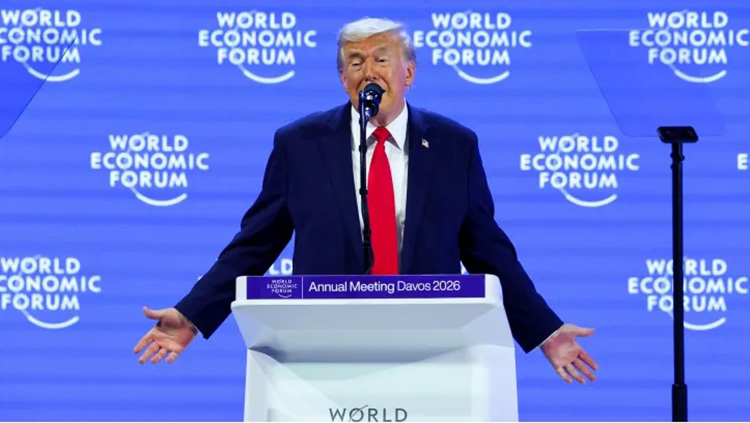
US President Donald Trump is insulting friends and intimidating others. Perhaps. Following his rare feat of securing a non-consecutive second term, one would have expected Trump to be magnanimous, humble and strive to leave an imprint in world history as a statesman. However, considering the unfolding events, it is more likely that he will be leaving an imprint but for totally different reasons!
From the time of his re-election, Trump has apparently been determined to let the world know who the ‘boss’ is and wanted to Make America Great Again (MAGA) by economic measures that were detrimental even to his neighbours and friends, totally disregarding the impact it may have on the world economy. Some of his actions were risky and may well have backfired. Businessmen are accustomed to taking risks and he appears to behave as a businessman rather than as a politician. There was hardly any significant resistance to his arbitrary tariff increases except from China. He craved for the Nobel Peace Prize, claiming to have ended and prevented wars and, and unashamedly posed for a picture when the Nobel Peace Prize was ‘presented’ to him by the winner! To add insult to injury, Trump demonstrated his ignorance by blaming the Norwegian Prime Minister for having overlooked him for the Nobel Peace Prize. He should surely have known, before the Norwegian PM pointed out, that the awardee was chosen by a non-governmental committee.
Trump’s erratic behaviour reached its climax in Davos. He came to Davos determined to railroad the European leaders into accepting his bid to acquire Greenland and seemed to do so by hurling insults left, right and centre! Even before he started the trip to Davos, Trump had already imposed a 10% tariff on imports from seven European countries including the UK, increasing to 25% from the beginning of February, until he was able to acquire Greenland. In a rambling speech, lasting over an hour, he referred to Greenland as Iceland on four different occasions.
Exaggerating the part played by the US in World War II Trump proclaimed “Without us right now, you’d all be speaking German and a little Japanese”. After making a hideous claim that the US had handed Greenland to Denmark, after World War II, Trump said, “We want a piece of ice for world protection, and they won’t give it. You can say yes and we will be very appreciative. Or you can say no and we will remember”. A veiled threat, perhaps!
However, the remark that irked the UK most was his reference to the war in Afghanistan. He repeated the claim, made to Fox News, that NATO had sent ‘some troops’. but that they ‘had stayed a little back, a little off the front line’. On top of politicians, infuriated families of over 500 soldiers who sacrificed their lives in the front-lines in Afghanistan, started protesting which forced the British PM Keir Starmer to abandon the hitherto used tactic of flattery to win over Trump, to state that Trump’s remarks were “insulting and frankly appalling.” After a call from Starmer, Trump posted a praise on his Truth Social platform that UK troops are “among the greatest of all warriors”!
The resistance to Trump’s attempts at reverting to ‘unconstrained power of Great Powers’, which was replaced by the ‘rule-based-order’ after World War II, was spearheaded from an unlikely quarter. It was by Mark Carney, financier turned politician, PM of Canada. He was the Governor of the Bank of England, during the disastrous David Cameron administration, and left the post with hardly any impact but seems to have become a good politician. He apparently has hit Trump where it hurts most, as in his speech, Trump stated that Canada was living on USA and warned Carney about his language!
Mark Carney’s warning that this was a moment of “rupture” with the established rules-based international order giving way to a new world of Great Power politics and his rallying cry that “the middle powers” needed to act together, need to be taken seriously. What would the world come to, unless there is universal condemnation of actions like the forcible extraction of the Venezuelan President which, unfortunately, did not happen maybe because of the fear of Trump heaping more tariffs etc? What started in Venezuela can end up anywhere. Who appointed the US to be the policeman of the world?
With words, Trump gave false hope to protesters rebelling against the theocracy in Iran but started showing naval strength only after the regime crushed the rebellion by killing, according to some estimates, up to 25,000 protesters. If he decides to attack, Iran is bound to retaliate, triggering another war. In fact, Trump was crass enough to state that he no longer cares for peace as he was snubbed by the Nobel Peace committee! Trump is terrorising his own people as is happening in Minnesota but that is a different story.
Already the signs of unity, opposing Trump’s irrationalities, are visible. Almost all NATO members opposing Trump’s plans resulted in his withdrawal from Greenland acquisition plans. To save face, he gave the bogus excuse that he had reached an ever-lasting settlement! Rather than flattery, Trump’s idiosyncrasies need to be countered without fear, as well illustrated by the stance the British PM was forced to take on the Afghan war issue. For the sake of world peace, let us hope that Trump will be on the retreat from now.
Mark Carney’s pivotal speech received a well-deserved and rare standing ovation in Davos. One can only hope that he will practice what he preached to the world, when it comes to internal politics of his country. It is no secret that vote-bank politics is playing a significant role in Canadian politics. I do hope he will be able to curtail the actions of remnants of terrorist groups operating freely in Canada.
by Dr Upul Wijayawardhana
Features
Trump is a product of greed-laden American decadence
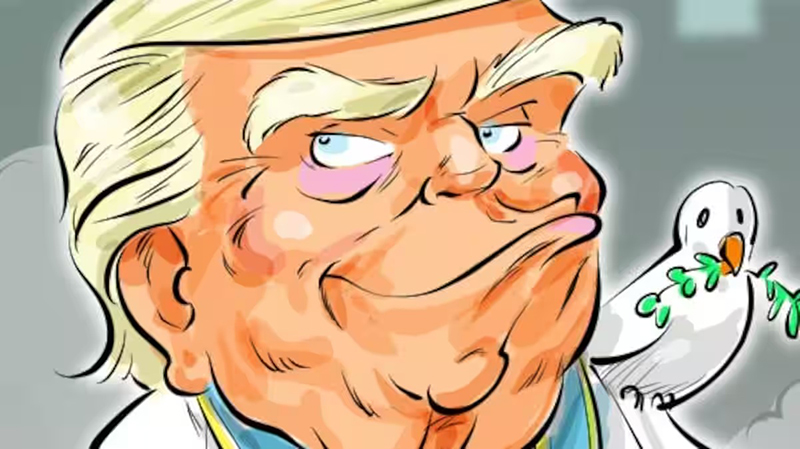
One wonders why the people of the US, who have built the most technologically and economically advanced country, ever elected Donald Trump as their President, not once, but twice. His mistakes and blunders in his first term are too numerous to mention, but a few of the most damaging to the working people are as follows:
Trump brought in tax cuts that overwhelmingly favour the wealthy over the average worker. The Tax Cuts and Jobs Act (TCJA) signed into law, at the end of 2017, provides a permanent cut in the corporate income tax rate that will overwhelmingly benefit capital owners and the top one percent. His new laws took billions out of workers’ pockets by weakening or abandoning regulations that protect their pay. In 2017 the Trump administration hurt workers’ pay in many ways, including acts to dismantle two key regulations that protect the pay of low- to middle-income workers. These failures to protect workers’ pay could cost workers an estimated $7 billion per year. In 2017, the Trump administration—in a virtually unprecedented move—switched sides in a case before the US Supreme Court and fought on the side of corporate interests and against workers.
Trump’s policies on climate change could ruin the global plans to cut down emissions and reduce warming, which has already affected the US equally badly as anywhere else in the world. Trump ridiculed the idea of man-made climate change, and repeatedly referred to his energy policy under the mantra “drill, baby, drill”. He said he would increase oil drilling on public lands and offer tax breaks to oil, gas, and coal producers, and stated his goal for the United States to have the lowest cost of electricity and energy of any country in the world. Trump also promised to roll back electric vehicle initiatives, proposed once again the United States withdrawal from the Paris Agreement, and rescind several environmental regulations. The implementation of Trump’s plans would add around 4 billion tons of carbon dioxide to the atmosphere by 2030, also having effects on the international level. If the policies do not change further, it would add 15 billion tons by 2040 and 27 billion by 2050. Although the exact calculation is difficult, researchers stated: “Regardless of the precise impact, a second Trump term that successfully dismantles Biden’s climate legacy would likely end any global hopes of keeping global warming below 1.5C.” ( Evans, et al, 2024). Despite all these anti-social policies Trump was voted into power for a second term.
Arguments suggesting the USA is a decadent society, defined as a wealthy civilisation in a state of stagnation, exhaustion, and decline, are increasingly common among commentators. Evidence cited includes political gridlock, economic stagnation since the 1970s, demographic decline, and a shift toward a “cultural doom loop” of repeating past ideas (Douthat, 2024, New York Times).
First, we will look at the economic aspect of the matter though the moral and spiritual degradation may be more important, for it is the latter that often causes the former . The reasons for the economic decline, characterised by increase in inequality, dates back to the seventies. Between 1973 and 2000, the average income of the bottom 90 percent of US taxpayers fell by seven percent. Incomes of the top one percent rose by 148 percent, the top 0.1 percent by 343 percent, and the top 0.01 percent rose by 599 percent. The redistribution of income and wealth was detrimental to most Americans.
If the income distribution had remained unchanged from the mid-1970s, by 2018, the median income would be 58 percent higher ($21,000 more a year). The decline in profits was halted, but at the expense of working families. Stagnant wages, massive debt and ever longer working hours became their fate.
Since 1973, the US has experienced slower growth, lower productivity, and a diminished share of global manufacturing, notes the (American Enterprise Institute). Despite the low growth, the rich have doubled their wealth. In our opinion this is due to the “unleash of a culture of greed” that Joseph Stiglitz spoke about.
Nobel Prize winning economist Joseph Stiglitz has frequently argued that the United States has unleashed a culture of greed, selfishness, and deregulation, which he blames for extreme inequality, financial crises, and environmental destruction.
Income stagnation is not the only quality of life indicator that suffered. In 1980, life expectancy in the US was about average for an affluent nation. By the 2020s, it dropped to the lowest among wealthy countries, even behind China or Chile, largely due to the stagnation of life expectancy for working-class people. With regard to quality of life the US has fallen to 41st in global, UN-aligned, sustainable development rankings, highlighting issues with infrastructure and social systems, (The Conversation). The political system is described as trapped in a “stale system” with high polarisation, resulting in inaction rather than progress, (Douthat, New York Times).
It is often the moral and spiritual degradation that causes an overall decline in all aspects of life, including the US economy. Statistics on crime, drug and alcohol addiction, suicide rate and mental health issues in the US, which are the indicators for moral and spiritual status of a society, are not very complimentary. The Crime Index in the US is 49 while it is 23 in China and 32 in Russia. Drug abuse rate is 16.8% in the US and alcohol addiction is 18%. Mental illness in adults is as common as 23%. Only about 31% follow a religion. Erich Fromm in his book, titled “Sane Society,” refers to these facts to make a case that the US and also other countries in the West are not sane societies.
Let us now look at Joseph Stiglitz’s thoughts on greed which is the single most important factor in the aetiology of moral degradation in the US society. Stiglitz has directly linked corporate greed and the pursuit of immediate, short-term profits to accelerating climate change and economic failure for the majority of Americans. He argues that “free” (unregulated) markets in the US have not led to growth, but rather to the exploitation of workers and consumers, allowing the top 1% to siphon wealth from the rest of society. Stiglitz argues that neoliberalism, which he calls “ersatz capitalism,” has fostered a moral system where banks are “too big to fail, but too big to be held accountable,” rewarding greedy, risky behaviour. He contends that US economic policies have been designed to favour the wealthy, creating a “rigged” economy where the middle class is shrinking. In essence, Stiglitz argues that the US has allowed a “neoliberal experiment” to turn capitalism into a system focused on greed, which is harming the economy, the environment, and the social fabric.
Big oil companies spent a stunning $445m throughout the last election cycle to influence Donald Trump and Congress, a new analysis has found. These investments are “likely to pay dividends”, the report says, with Republicans holding control of the White House, House and Senate – as well as some key states. Trump unleashed dozens of pro-fossil fuel executive actions on his first day in office and is expected to pursue a vast array of others with cooperation from Congress (The Guardian, Jan 2025).
Trump himself has accumulated wealth just as much as the rest of billionaires, and his poor voters are becoming poorer. He is greedy for wealth and power. He is carving up the world and is striving to annex as much of it as possible at the expense of sovereignty of other countries, the US allies, and international law.
Greed is an inherent human character which when unfettered could result in psychopathic monsters like Hitler. A new world order will have to take into serious consideration this factor of greed and evolve a system that does not depend on greed as the driver of its economy.
by N. A. de S. Amaratunga
-

 Business5 days ago
Business5 days agoClimate risks, poverty, and recovery financing in focus at CEPA policy panel
-

 Opinion4 days ago
Opinion4 days agoSri Lanka, the Stars,and statesmen
-

 Business3 days ago
Business3 days agoHayleys Mobility ushering in a new era of premium sustainable mobility
-

 Business3 days ago
Business3 days agoAdvice Lab unveils new 13,000+ sqft office, marking major expansion in financial services BPO to Australia
-

 Business3 days ago
Business3 days agoArpico NextGen Mattress gains recognition for innovation
-

 Business2 days ago
Business2 days agoAltair issues over 100+ title deeds post ownership change
-

 Business2 days ago
Business2 days agoSri Lanka opens first country pavilion at London exhibition
-

 Editorial3 days ago
Editorial3 days agoGovt. provoking TUs

